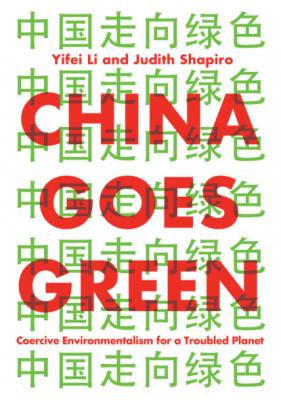ТОП просматриваемых книг сайта:
China Goes Green. Judith Shapiro
Читать онлайн.Название China Goes Green
Год выпуска 0
isbn 9781509543137
Автор произведения Judith Shapiro
Издательство John Wiley & Sons Limited
246 242
247 243
248 244
249 245
China Goes Green
Coercive Environmentalism for a Troubled Planet
Yifei Li and Judith Shapiro
polity
Copyright page
Copyright © Yifei Li and Judith Shapiro 2020
The right of Yifei Li and Judith Shapiro to be identified as Authors of this Work has been asserted in accordance with the UK Copyright, Designs and Patents Act 1988.
First published in 2020 by Polity Press
Polity Press
65 Bridge Street
Cambridge CB2 1UR, UK
Polity Press
101 Station Landing
Suite 300
Medford, MA 02155, USA
All rights reserved. Except for the quotation of short passages for the purpose of criticism and review, no part of this publication may be reproduced, stored in a retrieval system or transmitted, in any form or by any means, electronic, mechanical, photocopying, recording or otherwise, without the prior permission of the publisher.
ISBN-13: 978-1-5095-4311-3
ISBN-13: 978-1-5095-4312-0 (pb)
A catalogue record for this book is available from the British Library.
Library of Congress Cataloging-in-Publication Data
Names: Li, Yifei, 1978- author. | Shapiro, Judith, author.
Title: China goes green : coercive environmentalism for a troubled planet / Yifei Li and Judith Shapiro.
Description: Cambridge, UK ; Medford, MA : Polity, 2020. | Includes bibliographical references and index. | Summary: “Can China’s eco-authoritarianism save the planet?”-- Provided by publisher.
Identifiers: LCCN 2020002554 (print) | LCCN 2020002555 (ebook) | ISBN 9781509543113 (hardback) | ISBN 9781509543120 (paperback) | ISBN 9781509543137 (epub)
Subjects: LCSH: Environmental policy--China. | Environmentalism--China. | Authoritarianism--China. | China--Environmental conditions--21st century.
Classification: LCC GE190.C6 L54 2020 (print) | LCC GE190.C6 (ebook) | DDC 363.700951--dc23
LC record available at https://lccn.loc.gov/2020002554
LC ebook record available at https://lccn.loc.gov/2020002555
Typeset in 11 on 13pt Sabon
by Fakenham Prepress Solutions, Fakenham, Norfolk NR21 8NL
Printed and bound in Great Britain by CPI Group (UK) Ltd, Croydon
Every effort has been made to trace all copyright holders, but if any have been overlooked the publisher will be pleased to include any necessary credits in any subsequent reprint or edition.
For further information on Polity, visit our website: politybooks.com
Map
Acknowledgments
We are most grateful to two anonymous readers who helped us strengthen this book and to Isabella Baranyk, who provided exceptionally thoughtful and comprehensive feedback on drafts. We also acknowledge insightful comments and contributions from colleagues, friends, and relatives, including Jisho Warner, Elska Lennox, Rosa Shapiro-Thompson, Ivan Willis Rasmussen, Simon Nicholson, Jesse Ribot, Ken Conca, Craig Simons, and Bo Donners. Chen Qihang and Yuan Qianchun provided helpful research. Marcela Godoy generously shared her artwork. Tian Tian Wedgwood Young assembled the index. We are also grateful to our experienced editors at Polity, Louise Knight and Inès Boxman. Steve Leard designed an interesting cover, Neil de Cort expertly managed the production, and Ian Tuttle performed masterful copy edits. We are also immensely grateful to each other, for seamlessly building on the other’s strengths to create a much better book than either of us could have written on our own.
Introduction: The Rise of Authoritarian Environmentalism
A decade or so after the start of the twenty-first century, China’s policy makers appeared poised to assume global leadership on environmental protection. Where just a few years before, Chinese negotiators in global forums had argued vociferously for the primacy of international legal principles that protected developing country interests, China began to moderate its use of these arguments. Instead of focusing on the right to development, technology transfer from developed to developing countries, financing for mitigation and adaptation, absolute sovereignty over natural resources, and common but differentiated responsibilities, China’s leaders began to speak about climate change and other environmental challenges as shared global threats. Where at one time the country was seen as a primary obstacle to achieving consensus on these issues, China seemed to some observers as the last best hope for efforts to save the planet.
At around the same time, environmental governance was changing dramatically within China. Once seen as having weak environmental institutions with poor enforcement capabilities, China renamed and elevated the environment ministry to become the Ministry of Ecology and Environment, expanding and centralizing its portfolio of responsibilities to cover a broad range of pollutants including carbon emissions and water contaminants. Once seen as unable to control local officials who exploited lax enforcement to profit from pollution, China’s leaders changed criteria for performance evaluation to emphasize environmental protection and implemented severe punishments for local officials’ failures to fulfill environmental goals. Once seen as unable to enforce its assortment of environmental laws, China strengthened them, got rid of loopholes, created a system of dedicated environmental courts, and opened up the judicial process to environmental advocacy groups. Once seen as bent on destroying its own biodiversity, China reorganized the

